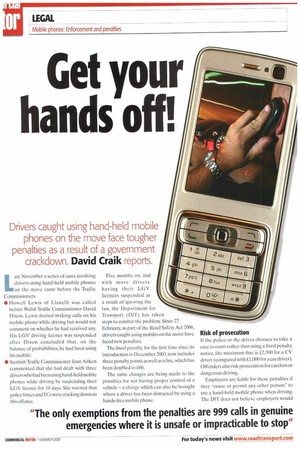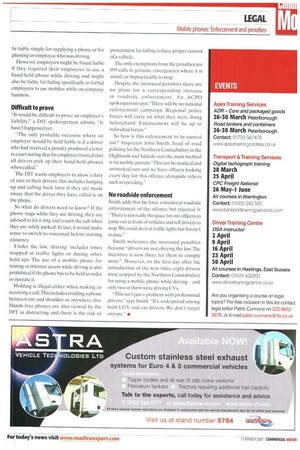Get your hands off!
Page 38

Page 39

If you've noticed an error in this article please click here to report it so we can fix it.
Drivers caught using hand-held mobile phones on the move face tougher penalties as a result of a government
crackdown. David Craik reports.
Last November a series of cases involving drivers using hand-held mobile phones on the move came before the Traffic Commissioners.
• Howell Lewis of Llanelli was called before Welsh Traffic Commissioner David Dixon. Lewis denied making calls on his mobile phone while driving but would not comment on whether he had received any. His LGV driving licence was suspended after Dixon concluded that, on the balance of probabilities, he had been using his mobile.
• Scottish Traffic Commissioner Joan Aitken commented that she had dealt with three drivers who had been using hand-held mobile phones while driving by suspending their LGV licence for 10 days. She warned that police forces and TCs were cracking down on this offence. Five months on, and with more drivers having their LGV licences suspended as a result of ignoring the law, the Department for Transport (DfT) has taken steps to combat the problem. Since 27 February, as part of the Road Safety Act 2006. drivers caught using mobiles on the move have faced new penalties.
The fixed penalty, for the first time since its introduction in December 2003, now includes three penalty points as well as a fine, which has been doubled to £60.
The same changes are being made to the penalties for not having proper control of a vehicle — a charge which can also be brought where a driver has been distracted by using a hands-free mobile phone. Risk of prosecution If the police or the driver chooses to take a case to court rather than using a fixed penalty notice, the maximum fine is /2,500 for a CV driver (compared with £1.000 for a car driver). Offenders also risk prosecution for careless or dangerous driving.
Employers are liable for these penalties if they "cause or permit any other person" to use a hand-held mobile phone when driving. The DfT does not believe employers would be liable simply for supplying a phone or for phoning an employee who was driving.
However, employers might be found liable if they required their employees to use a hand-held phone while driving and might also be liable for failing specifically to forbid employees to use mobiles while on company business.
Difficult to prove
"It would be difficult to prove an employer's liability," a DfT spokesperson admits. "It hasn't happened yet.
"The only probable occasion where an employer would he held liable is if a driver who had received a penalty produced a letter in court stating that his employer insisted that all drivers pick up their hand-held phones when called."
The DfT wants employers to show a duty of care to their drivers: this includes hanging up and calling back later if they are made aware that the driver they have called is on the phone.
So what do drivers need to know? If the phone rings while they are driving, they are advised to let it ring and return the call when they are safely parked. In fact, it would make sense to switch to voicemail before starting a journey.
Under the law, 'driving" includes times stopped at traffic lights or during other hold-ups. The use of a mobile phone for texting or internet access while driving is also prohibited if the phone has to be held in order to operate it.
Holding is illegal either when making or receiving a call.This includes cradling a phone between ear and shoulder or anywhere else. Hands-free phones are also viewed by the DfT as distracting and there is the risk of prosecution for failing to have proper control of a vehicle.
The only exemptions from the penalties are 999 calls in genuine emergencies where it is unsafe or impracticable to stop.
Despite the increased penalties there are no plans for a corresponding increase in roadside enforcement. An ACP° spokesperson says: "There will be no national enforcement campaign. Regional police forces will carry on what they were doing beforehand. Enforcement will be up to individual forces."
So how is this enforcement to be carried out? Inspector John Smith, head of road policing for the Northern Constabulary in the Highlands and Islands, says the main method is via mobile patrols: "This can be marked and unmarked cars and we have officers looking every day for this offence alongside others such as speeding."'
No roadside enforcement
Smith adds that his force considered roadside enforcement of the offence but rejected it: -There is not really the space for our officers to jump out in front of vehicles and tell drivers to stop. We could do it at traffic lights but haven't to date."
Smith welcomes the increased penalties because "drivers are not obeying the law.The incentive is now there for them to comply more". However, on the first day after the introduction of the new rules, eight drivers were stopped by the Northern Constabulary for using a mobile phone while driving and only two of them were driving CVs.
"This isn't just a problem with professional drivers," says Smith. "It's widespread among both LGV and car drivers. We don't target anyone."


























































































































































































